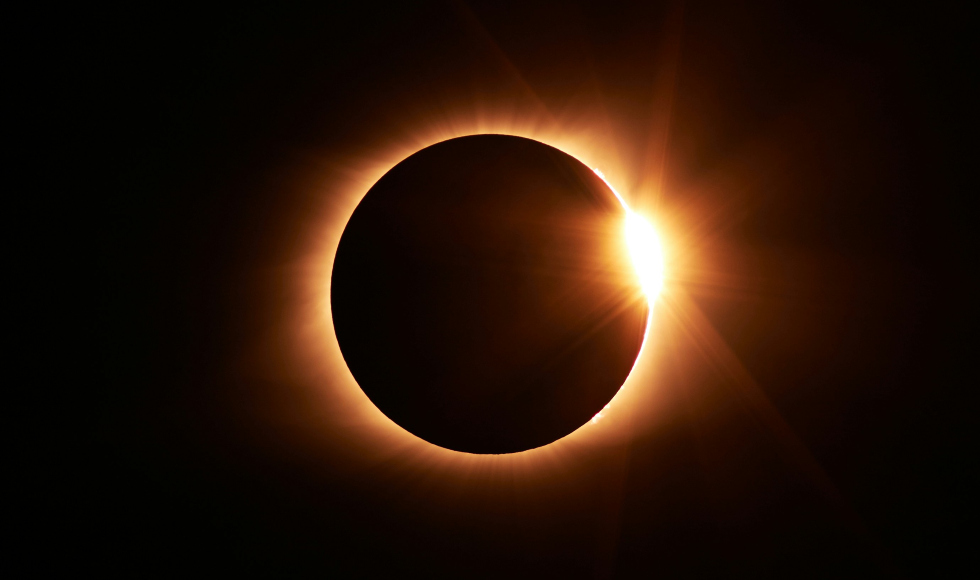Total eclipse in the past: How astronomy and astrology went hand-in-hand in the Renaissance

What did people in past centuries think when the sky suddenly went dark? History PhD student Tina Kocic shares some insights on Renaissance attitudes to science, superstition and the skies. (Photo by Jongsun Lee/Unsplash)
BY Sara Laux, Faculty of Humanities
April 9, 2024
With today’s modern technology and astronomical knowledge, most preparations for the 2024 eclipse revolved around science and safety.
And while it’s tempting to think that folks who lived centuries ago viewed eclipses less in terms of science and more as signs of impending doom, the reality, says history PhD candidate Tina Kocic, is more complicated.
We chatted with her about her research, and what people in the Renaissance actually thought about eclipses.
Before we talk about eclipses specifically, can you tell me a little about your research?
I study the reception of astrology and astrological magic during the Italian Renaissance.
In particular, I’m looking at how a famous Renaissance philosopher, Marsilio Ficino (1433-1499), attempted to synthesize classical polytheistic (that is, “pagan”) religious practices with Christianity though his practice of magic.
What’s perhaps most surprising to learn is that, religiously speaking, even members of the Catholic Church in this period relied heavily on astrology and magic in their everyday lives. These practices were only seen as transgressive if those practising them attempted to rely on the help of supernatural entities during the performance of magic, thus making it “demonic” magic, which was deemed very dangerous to one’s soul.
So what did people in Renaissance times think about eclipses? Were there a variety of ideas about what they were, or what they meant?
The answer to this question is more complicated than we might suppose.
Contrary to the idea that people in the medieval or early modern periods were heavily superstitious and as far from science as you could get, scholars in this period were well aware of how eclipses happened.
Astronomy (the study of the movements of the celestial bodies) and astrology (the interpretation of these celestial movements and their supposed effects on our Earthly realm) were core subjects taught at most European universities.
Both of these practices require a lot of math. Scholars in this period knew that eclipses occurred when the Moon’s path crossed that of the Sun (also called the ecliptic), either in opposition to each other (180 degrees apart) or in a conjunction (0 degrees apart).
So, mathematically, they understood what was happening between these two celestial bodies, and carefully charted and drew the various phases of solar eclipses.
A total solar eclipse was also a subject of various art works, including Raphael’s Isaac and Rebecca Spied Upon by Abimelech (1518-1519).
On the other hand, eclipses have long been seen as omens or portents of something – but that something isn’t always clear. Being unsettled by eclipses goes back thousands of years where ancient societies saw them as signs of the gods’ wrath and displeasure with human affairs.
One belief during the Renaissance was that, upon Christ’s death on the cross, an unexpected, unnatural total solar eclipse occurred, casting the world into darkness as the Sun and Moon hid their faces together in grief.
Even if one rationally understood eclipses as the result of two celestial bodies crossing each other’s paths, it would still have been an unsettling thing for someone in the Renaissance to behold — day suddenly and prematurely turns to night.
People relied on the predicted times for sunrise, sunset and the seasons as a way of ordering their world and marking the passage of time (not to mention the importance of things going “as usual” for farmers, whose livelihoods depended on dependable natural phenomena). So when that natural order is disrupted, it would be quite the shock.
And, despite all our modern scientific knowledge, I think this rings true for us today too. I wouldn’t be too surprised to find more than a few people looking rather shifty when totality occurs — it’s something unusual and out of the ordinary, and that unsettles people, whether they be ancients, Renaissance scholars, or us today.
Was there a push and pull between science and superstition?
Yes and no.
We have to be careful how we word things because the line between what was considered science and superstition/religion was not always sharply demarcated. What today may be considered occult — spiritual practices like astrology, for instance — were regarded and respected sciences in the Renaissance.
Most people, even the popes at the time, relied on astrology and astrological predictions to make important decisions. Astrology was also fundamental to medicine; it was inextricable from it and doctors had to be trained in it.
Science, in certain respects, went head-to-head with religion on several occasions and, in those instances, it usually didn’t play out well for the scientists.
Perhaps the most famous example is that of Galileo (1564-1642). Up until that time, most people believed in geocentrism — that the Sun and other celestial bodies orbited the Earth. This was the view upheld by the Catholic Church at the time.
Galileo expounded heliocentrism, the notion that the Earth and the planets revolved around the Sun. His ideas were in direct opposition to those of the Church and he was subsequently investigated by the Roman Inquisition, was found guilty of heresy, and spent the rest of his life effectively under house arrest.
I suppose the accurate answer is “It depends.” If the science/superstition you’re practising aligns with what those running the Church are practising, all’s good and well. If not, the Inquisition will probably be at your doorstep shortly.
Learn more about the 2024 eclipse on the Daily News website.


